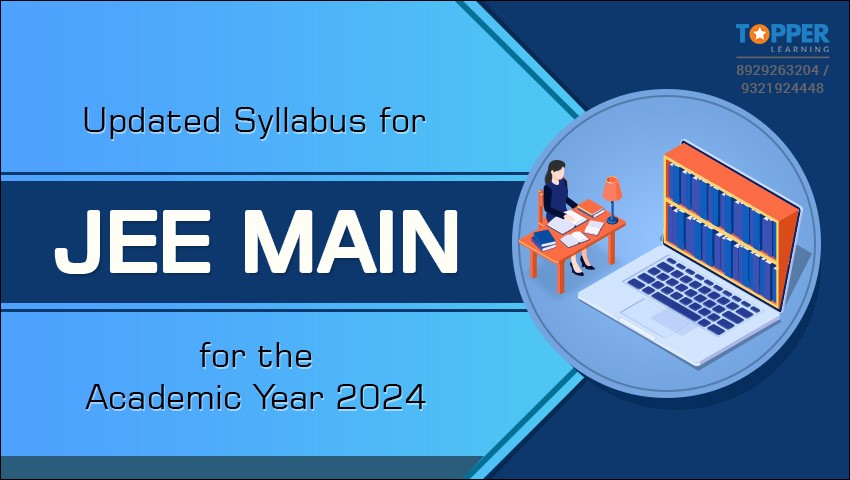Updated Syllabus for JEE Main for the Academic Year 2024

The revised syllabus for the JEE Main 2024 exam has been reduced by NTA for the academic year 2024. Learn more about the removed topics and detailed analysis of the syllabus in this article.
By Topperlearning Expert 22nd Nov, 2023 | 07:13 pm
Share
The aspirant students are speeding up their preparations for exams as NTA (National Testing Agency) released the examination syllabus for JEE Main for the academic year 2024-25. The examination dates for JEE Main Session 1 and Session 2 have been released and are expected to take place in January and April of the next year. JEE (Joint Entrance Exam) is known as one of the most competitive entrance exams in India. Learn more about the latest syllabus of JEE Main 2024 in this blog.
JEE Main 2024 Syllabus: What to Expect?
The anticipation of the JEE Main 2024 has begun with only a few months remaining for the exam. The students should prepare in accordance with the updated syllabus released by NTA for all three primary subjects. As the dates are coming closer, students should prepare and roll their sleeves for the entrance test. They should keep an eye out for syllabus updates, such as how many chapters have been removed or added to the final syllabus for JEE Main 2024.
For the academic year 2024, NTA has decided to reduce some syllabi for JEE Main. Some chapters from the subjects have been removed from the syllabus to match the NCERT class 11 and class 12 curriculam. From chemistry, a significant number of chapters have been removed.
JEE Main 2024 Syllabus Breakdown
The JEE Main paper is curated to test the student’s knowledge of physics, chemistry, and mathematics, which is their gateway to entering some of the most prestigious colleges in India, including IIT (Indian Institute of Technology).
The JEE Main exam is conducted in two parts: B.Tech and B.Arch/ B.Planning. Students must be well-prepared for all three subjects, and they can get help from high-quality study resources like NCERT class 11 solutions and NCERT class 12 solutions. The weightage breakdown for the JEE Main paper 1 for B.Tech/ B.E is as follows:
- Physics: The syllabus for JEE Main 2024 for physics is divided into 20 different units, which include topics like Kinematics, Electrostatics, etc. The theory section for physics contains 80% weightage with diverse topics, and the practical section contains 20% weightage.
- Chemistry: In chemistry, many topics have been removed from the syllabus for JEE Main. The chemistry syllabus contains 28 units, which are divided into three parts. The physical chemistry contains around 35.6% of the total weightage. Organic chemistry contains around 29.7% weightage, and inorganic chemistry contains approximately 34.7% weightage of the entire syllabus.
- Mathematics: The mathematics syllabus has a total of 16 units in the syllabus. The topics included in the JEE Main entrance exam are functions, probability, calculations, etc. Aspiring students can practise more and identify their strengths and weak areas of the subject.
For B.Arch/ B.Planning JEE Main Paper 2, mathematics holds 55% weightage, where students have to answer 5 out of 10 NVR (numeric value response) questions. The aptitude section holds 45% weightage.
Reduced Topics from the Revised Syllabus for JEE Main 2024
The official syllabus of physics, chemistry, and mathematics has been reduced with the removal of a few topics. The students can shift their focus to the remaining topics and prepare the syllabus in-depth with a tight schedule and the right strategies.
The removed chapters from the revised syllabus for all three subjects are as follows:
|
Physics |
||
|
Unit |
Deleted Topics |
Topics Added |
|
Physics and Measurement |
Accuracy and precision of measuring instruments |
Units of measurements, System of Units, S I Units |
|
Kinematics |
zero vector |
- |
|
Gravitation |
Geostationary satellites |
Motion of a satellite, time period, and energy of satellite |
|
Properties of Solids And Liquids |
Reynolds number, Newton’s law of cooling. |
Effect of gravity on fluid pressure, critical velocity, excess of pressure across a curved surface. |
|
Thermodynamics |
Carnot engine and its efficiency |
Isothermal and adiabatic processes |
|
Oscillations and Waves |
Free, forced and damped oscillations, resonance. Doppler Effect in sound. |
- |
|
Current Electricity |
Resistances of different materials .Colour code for resistors; Potentiometer - principle and its applications. |
mobility, and their relation with electric current, conductivity |
|
Magnetic Effects of Current and Magnetism |
Cyclotron, Earth’s magnetic field and magnetic elements. Magnetic susceptibility and permeability. Hysteresis. Electromagnets and permanent magnets. |
Magnetic field due to a magnetic dipole (bar magnet) along its axis and perpendicular to its axis. Torque on a magnetic dipole in a uniform magnetic field, the effect of temperature on magnetic properties. |
|
Electromagnetic Induction and Alternating Currents |
Quality factor |
- |
|
Optics |
Resolving power of microscopes and astronomical telescopes |
- |
|
Dual Nature of Matter and Radiation |
Davisson-Germer experiment |
- |
|
Atoms and Nuclei |
Isotopes, isobars: isotones. Radioactivity- alpha. beta and gamma particles/rays and their properties; radioactive decay law. |
- |
|
Electronic Devices |
Subtopics related to transistor |
- |
|
Communication Systems |
Complete chapter |
- |
|
CHEMISTRY |
||
|
Unit |
Deleted Topics |
Topics Added |
|
PHYSICAL CHEMISTRY
|
||
|
Some Basic Concepts in Chemistry |
Physical quantities and their measurements in Chemistry, precision, and accuracy, significant figures. S.I.Units, dimensional analysis |
|
|
States of Matter |
Deleted Unit |
|
|
Atomic Structure |
Thomson and Rutherford atomic models and their limitations |
|
|
Chemical Bonding and Molecular Structure |
||
|
Chemical Thermodynamics |
Entropy |
|
|
Solutions |
||
|
Equilibrium |
||
|
Redox Reactions and Electrochemistry |
||
|
Chemical Kinetics |
||
|
Surface Chemistry |
Deleted Unit |
|
|
INORGANIC CHEMISTRY |
||
|
Classification of Elements and Periodicity in Properties |
||
|
General Principles and Processes of Isolation of Metals |
Deleted Unit |
|
|
Hydrogen |
Deleted Unit |
|
|
s -Block Elements (Alkali and Alkaline Earth Metals) |
Deleted Unit |
|
|
p- Block Elements |
||
|
d - and f- Block Elements |
||
|
Co-Ordination Compounds |
||
|
Environmental Chemistry |
Deleted Unit |
|
|
ORGANIC CHEMISTRY |
||
|
Purification and Characterisation of Organic Compounds |
||
|
Some Basic Principles of Organic Chemistry |
||
|
Hydrocarbons |
||
|
Organic Compounds Containing Halogens |
||
|
Organic Compounds Containing Oxygen (Alcohols, Phenols, and Ethers, Aldehyde, Ketones and Carboxylic Acids) |
||
|
Organic Compounds Containing Nitrogen |
||
|
Polymers |
Deleted Unit |
|
|
Biomolecules |
Hormones (General introduction) |
|
|
Chemistry in Everyday Life |
Deleted Unit |
|
|
Principles Related to Practical Chemistry |
||
|
Mathematics |
||
|
Unit |
Deleted Topics |
Topics Added |
|
Complex Numbers and Quadratic Equations |
Square root of a complex number, triangle inequality |
- |
|
Matrices and Determinants |
Properties of determinants, elementary transformations |
- |
|
Binomial Theorem and Its Simple Applications |
Properties of Binomial coefficients |
- |
|
Sequence and Series |
Sum up to n terms of special series; Sn, Sn2, Sn3. Arithmetico-Geometric progression |
- |
|
Limit, Continuity, and Differentiability |
Rolle’s and Lagrange’s Mean value Theorems |
- |
|
Integral Calculus |
Integral as the limit of a sum |
- |
|
Coordinate Geometry |
Translation of axes, Straight line: equations of internal and external by sectors of angles between two lines . Equation of the family of lines passing through the point of intersection of two lines.
Circle, conic sections: Condition for a line to be tangent to a circle, equation of the tangent. condition for Y = mx +c to be a tangent and point (s) of tangency. |
- |
|
Three Dimensional Geometry |
Equations of a line and a plane in different forms, the intersection of a line and a plane, coplanar lines |
- |
|
Vector Algebra |
Scalar and vector triple product |
- |
|
Statistics and Probability |
Bernoulli trials, and binomial distribution |
- |
|
Trigonometry |
Heights, and distance |
- |
|
Mathematical Inductions |
The whole chapter is removed |
- |
|
Mathematical Reasoning |
The whole chapter is removed |
- |
Eligibility Criteria for JEE Main 2024 Exam
The JEE Main entrance exam is applicable for top-level colleges in India, including IITs, NITs, etc. The eligibility criteria for JEE Main 2024 are as follows:
- Aspiring candidates should secure at least 5% marks in the class 12th examinations in order to appear in JEE Main 2024, or they should be in the top 20 percentile for the class 12th board examinations.
- The SC/ ST candidates are required to score at least 65% marks in the class 12 examinations.
In order to appear in the JEE Main exam, depending upon the paper, the students have to qualify in different subjects during the class 12th examination based on the course they want to opt for.
Expert Feedback for JEE Main 2024: Your Key to Success
Expert feedback for Physics:
- One chapter and many topics are removed for the JEE Main 2024 exam to align as per CBSE boards.
- Also, a few topics have been added as well, but overall, this will be a great relief for current-year aspirants.
- Due to these changes, aspirants must realign their preparation strategies.
- Now, since the syllabus is aligned to CBSE boards, it is advisable for students to focus on their board exams as well to build a solid conceptual foundation.
- Although these changes will not impact students targeting JEE advance much.
Expert feedback for Chemistry:
- For the JEE Main 2024 exam to comply with CBSE boards, eight units and many topics have been deleted.
- A few topics have also been added as well, but this will be a huge relief for current-year applicants.
- As a result of these modifications, aspirants must adjust their preparation plans.
- Now that the syllabus matches CBSE boards, students should focus on their board exams as well to establish a sound conceptual basis.
- However, these modifications will influence students pursuing JEE advancement little.
Expert Feedback for Mathematics:
- Two chapters (Mathematical Inductions & Mathematical Reasoning) which never had a weightage for JEE, are not there in the syllabus for this year as well.
- A few topics from different chapters have been deleted from the syllabus, giving relaxation to the aspirants.
- Do not go for the deleted topics; focus more on the existing syllabus.
- No new topics have been added in the mathematics section.
Prepare for JEE Main 2024 Exam with Rightful Resources
Millions of aspiring students appear in the JEE Main exam to fulfil their dream of becoming an engineer. The updated syllabus focuses on the topics that are more useful for students. They can prepare the necessary topics for the JEE Main entrance test and understand the topic with more insights.
TopperLearning has carefully curated the essential study resources that can help the students prepare for JEE Main with ease. You can ace the exams with the previous year’s question papers, video lessons, etc.
In case of any queries, drop them in the Ask a Doubt section!
FAQ's
Q 1. What is the purpose of the JEE Main Exam?
Ans. JEE (Joint Entrance Exam) is the ultimate test for aspiring students who want to pursue engineering. It is a national entrance exam conducted all across India for students to get admission on the basis of their entrance exam scores in the most renowned colleges for engineering.
Q 2. What is the mode for JEE Main 2024 Exam?
Ans. NTA is organising the JEE Main Exam 2024, which is an online computer-based test for students who want to secure their places in prestigious engineering colleges.
Q 3. Is it compulsory for students to appear in both sessions of the JEE Main 2024 Exam?
Ans. No, it is not compulsory to appear in both sessions. Students are free to choose if they want to take the exam for both sessions or just one.
|
Physics |
||
|
Unit |
Deleted Topics |
Topics Added |
|
Physics and Measurement |
Accuracy and precision of measuring instruments |
Units of measurements, System of Units, S I Units |
|
Kinematics |
zero vector |
- |
|
Gravitation |
Geostationary satellites |
Motion of a satellite, time period, and energy of satellite |
|
Properties of Solids And Liquids |
Reynolds number, Newton’s law of cooling. |
Effect of gravity on fluid pressure, critical velocity, excess of pressure across a curved surface. |
|
Thermodynamics |
Carnot engine and its efficiency |
Isothermal and adiabatic processes |
|
Oscillations and Waves |
Free, forced and damped oscillations, resonance. Doppler Effect in sound. |
- |
|
Current Electricity |
Resistances of different materials .Colour code for resistors; Potentiometer - principle and its applications. |
mobility, and their relation with electric current, conductivity |
|
Magnetic Effects of Current and Magnetism |
Cyclotron, Earth’s magnetic field and magnetic elements. Magnetic susceptibility and permeability. Hysteresis. Electromagnets and permanent magnets. |
Magnetic field due to a magnetic dipole (bar magnet) along its axis and perpendicular to its axis. Torque on a magnetic dipole in a uniform magnetic field, the effect of temperature on magnetic properties. |
|
Electromagnetic Induction and Alternating Currents |
Quality factor |
- |
|
Optics |
Resolving power of microscopes and astronomical telescopes |
- |
|
Dual Nature of Matter and Radiation |
Davisson-Germer experiment |
- |
|
Atoms and Nuclei |
Isotopes, isobars: isotones. Radioactivity- alpha. beta and gamma particles/rays and their properties; radioactive decay law. |
- |
|
Electronic Devices |
Subtopics related to transistor |
- |
|
Communication Systems |
Complete chapter |
- |
More from Education
Important Resources
- Education Franchisee opportunity
- NCERT Solution
- CBSE Class 9 Mathematics
- NCERT Solutions for class 10 Science
- Sample Papers
- CBSE Class 9 Science
- NCERT Solutions for class 10 Maths
- Revision Notes
- CBSE Class 10 Hindi
- CBSE Class 10 English
- CBSE Class 10 English
- CBSE Class 10 Social Studies
- CBSE Class 10 Science
- CBSE Class 10 Mathematics
- Career In Science After 10
- Career In Commerce After 10
- Career In Humanities/Arts After 10
- NCERT Solutions for Class 10
- NCERT Solutions for Class 11
- Business Studies Class 12 CBSE project





